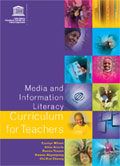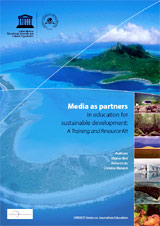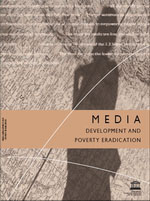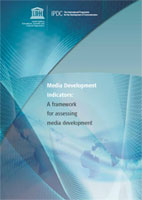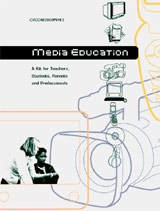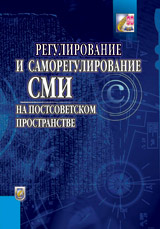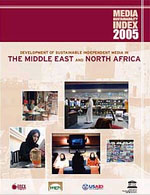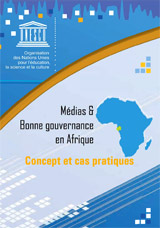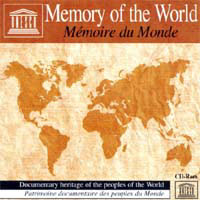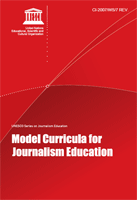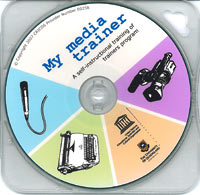The Manual for ICT illiterate radio practitioners, edited by Santiago Gago and published jointly by UNESCO, Radialistas Apasionadas y Apasionados, and Radioteca Intercambio de Audios (Radioteca.net), is conceived as a simple and effective tool to assist community radio professionals to master the technological aspects of radio broadcasting.
Publication year: 2010
The Mapping of communication and journalism training institutions and programmes in Latin America and the Caribbean was conducted by FELAFACS following UNESCO’s request.
Publication year: 2009
This publication, produced jointly by UNESCO, the UN Alliance of Civilizations, the European Commission and Grupo Comunicar, offers a comprehensive and multidimensional approach to media education. It provides answers to key questions for media, communication and education professionals, researchers and policy makers.
Publication year: 2009
This report focuses on data systems and measurement issues with regard to ICT, including aspects of data availability, international comparability and quality, as well as their content.
Publication year: 2003
UNESCO has been emphasizing the concept of “knowledge societies”, which stresses plurality and diversity instead of a global uniformity in order to bridge the digital divide and to form an inclusive information society. An important theme of this concept is that of multilingualism for cultural diversity and participation for all the languages in cyberspace.
Publication year: 2005
Since its inception, UNESCO has been defending the right to “seek, receive and impart” information. To celebrate World Press Freedom Day 2005, held in Dakar, Senegal, UNESCO chose “Media and Good Governance” as the key theme, eliciting the wide range of views that have been adapted to form this book.
Publication year: 2006
Publication year: 2000
This Media and Information Literacy Curriculum for Teachers is an important resource for Member States in their continuing work towards achieving the objectives of the Grünwald Declaration (1982), the Alexandria Declaration (2005) and the UNESCO Paris Agenda (2007) – all related to MIL.
Publication year: 2011
This training kit attempts to provide media professionals with basic information about some priority issues for sustainable development. It also provides practical exercises to inspire investigative reporting, and draws links to existing experience that may enrich the information resources of media professionals.
Publication year: 2008
The articles in this book have been adapted from contributions to the UNESCO-sponsored conference in Colombo, Sri Lanka marking World Press Freedom Day on May 3, 2006.
Publication year: 2006
This paper defines indicators of media development in line with the priority areas of the International Programme for the Development of Communication (IPDC): promotion of freedom of expression and media pluralism; development of community media; and human resource development (capacity building of media professionals and institutional capacity building).
Publication year: 2008
This Training Kit provides a complex and comprehensive view of media education, encompassing all media, old and new. It seeks new ways in which people can enhance their participation in the political and cultural life of the general community through the media. In particular, it promotes young people’s access to the media, while also increasing their critical appreciation of its activities. It has a sustainable development perspective and addresses some of the challenges of knowledge societies, especially the digital knowledge divide.
Publication year: 2006
The present study of the UNESCO International Programme for the Development Communication (IPDC) – undertaken at the initiative of The Norwegian Ministry of Foreign Affairs – is basically a desk study of the Programme's organizational structure, its history and impact supplemented by an evaluation of selected projects based on IPDC reports and evaluations.
Publication year: 2002
The study includes an overview of the existing media legislation in ten multi-party democratic countries in Africa and a comparative analysis, whilst also putting the legislation in perspective with regional and international standards, and best-practices in the field of media law conducive to freedom of expression.
Publication year: 2007
The manual is designed with a specific focus on Public Service Broadcasting, but it could be used by every interested individual or media practitioner.
Publication year: 2009
This handbook on media regulation and self-regulation is based on the outcomes of the International Summer School organized in 2009 in Belarus with the support of UNESCO’s Moscow Office. The event targeted media law experts and media educators from Armenia, Azerbaijan, Belarus and the Russian Federation.
Publication year: 2009
Drawing on its unique experience in developing a successful Media Sustainability Index (MSI) for Europe and Eurasia over the past five years, IREX is now expanding its in-depth analysis of the conditions for independent media to the Middle East and North Africa (MENA) region.
Publication year: 2006
The World Press Freedom Day in 2004 was dedicated to the theme “Support to media in violent conflict and countries in transition.” This book explores various responses to this theme, which were presented at the UNESCO-sponsored conference in Belgrade marking Press Freedom Day.
Publication year: 2004
This book presents an overview of case studies on media and good governance. It contains articles by intellectuals and journalists from eight African countries: Benin, Burundi, Cameroun, Côte d'Ivoire, Gabon, Mali, Senegal and Togo.
Publication year: 2010
Publication year: 2002
The Internet sharpens the issues of the digital world and heritage. It obliges us to reconsider all our certainties about the very meaning of the word “preserve”, a meaning which comes to us from the remotest of past ages when humans for the first time inscribed what they knew on objects that were longer-lasting than they were, so that their memory could traverse the generations and reach us.
Publication year: 2003
The present document, prepared under contract with the International Federation of Library Associations and Institutions (IFLA), by Jan Lyall, National Library of Australia, is part of a series of inventories being compiled, so that UNESCO can play its role to the full as coordinator and catalyst of the Memory of the World Programme.
Publication year: 1996
In 1992, UNESCO launched the Memory of the World Programme to protect and promote the world’s documentary heritage through preservation and access. This CD-ROM provides information on the Programme and its functionning.
Publication year: 2005
This edition takes the original General Guidelines to the Memory of the World Programme work as a departure point. It comprehends the accumulated experience of the last six years, including debate on the selection criteria and nomination process for the Memory of the World Register at the 1997 and 1999 meetings of the International Advisory Committee, and the Second International Conference of Memory of the World in 2000.
Publication year: 2002
This document offers a guide to the important standars, recommended practices and reference works in the field of the preservation and conservation of documents of all types.
Publication year: 1998
This publication features the discussion amongst community media professionals on the role of independent media in the fight against urban violence.
Publication year: 2008
The proposed Journalism Curricula is a generic model that can be adapted according to each country’s specific needs. It takes full cognizance of the social, economic, political and cultural contexts of developing countries and emerging democracies, highlighting the connection between democracy and journalism and arguing for a more cross-disciplinary approach within journalism training centres.
Publication year: 2007
Multimedia Training Kit (MMTK) is a comprehensive suite of open-access, interactive, learning modules covering organizational, management, content production and issue-based training, for community multimedia centres (CMCs), community radio stations and telecentres. Its production is coordinated by the UNESCO-led consortium of partners. It can be downloaded from the ItrainOnline partners’ website.
Publication year: 2004
This interactive, self-instructional programme and resource kit is designed to help media professionals to develop their training skills and techniques, thus enabling them to initiate and implement courses, workshops and seminars.
Publication year: 2007











